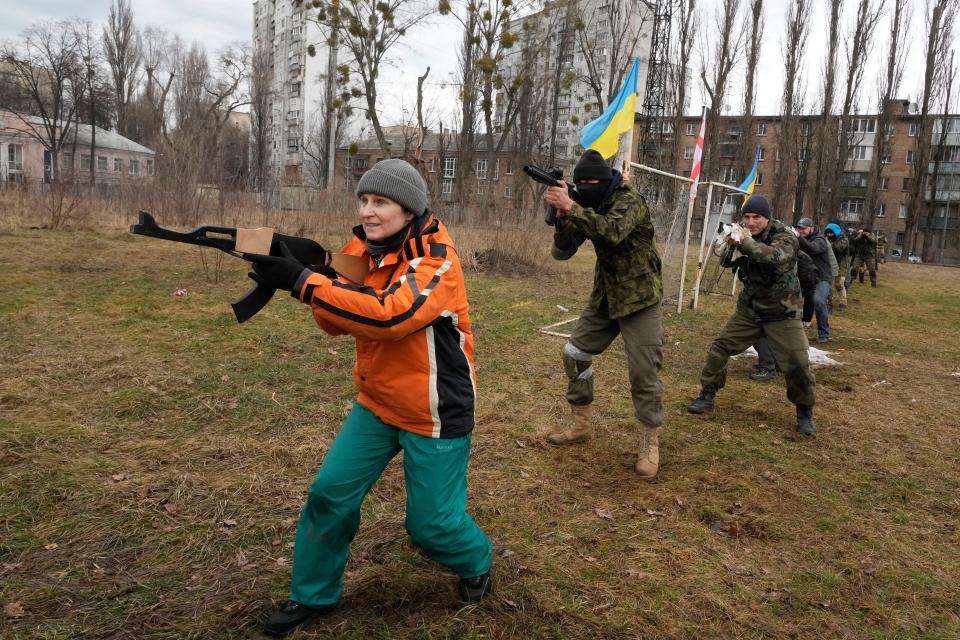Opinion: Why Vladimir Putin believes Russia must invade Ukraine
- Oops!Something went wrong.Please try again later.
For the past few weeks, I’ve been reading various authoritative sources about the Russian military threat to Ukraine. Understandably, most of these sources do not predict whether Russia will launch an invasion. Of course, the situational complexity of Russia threatening a nation so close to NATO makes any prediction fraught with peril. In fact, until recently, I believed even President Vladimir Putin might not have made his decision.
I now reject this view in favor of the proposition that Putin believes he must invade Ukraine.
Three factors compel Putin to seize Russia’s neighbor to the south. First is his desire to return Russia to a semblance of military and political status it occupied during the Cold War. Relatedly, Russia continues to have the ongoing problem of insufficient access to warm-water ports. And third, he has placed his military into a situation from which there is no turning back.
As Dan Bilefsy and Richard Pérez-Peña wrote in their Feb. 11 New York Times piece, “Mr. Putin appears intent on winding back the clock more than 30 years, establishing a broad, Russian-dominated security zone resembling the power Moscow wielded in Soviet days.” As a former Cold War KGB agent, Putin knows that the Soviet Union’s defeat made Russia a lesser power to both the United States and China. In short, he believes that seizing Ukraine will move his country closer to once again being a superpower equivalent to the United States.
More: Biden is getting Ukraine and Russia right after Obama fell short and Trump was a disaster
More: Who wins a Russian war against Ukraine? It could be China, Iran and North Korea.
Like all his global adversaries, Putin knows Russia would strengthen its geopolitical power by acquiring control of Ukraine’s deep warm water port of Odessa. As Tanvi Chauhan observed in the Air Force Journal of European, Middle Eastern & African Affairs, “Russia has no outlets to influence a world beyond its region. In the North, it is impeded by harsh winters; in the East by a dominant China; in the Black Sea by uncooperative actors; and in the Mediterranean by unreliable participants. … However, from its warm-water ports, the BSF is guaranteed to take on additional missions beyond the Black Sea at any time in the year, especially sealift operations and amphibious landings in the Mediterranean” (BSF refers to Russia’s Black Sea Fleet which includes hundreds of war ships).
A primary goal of Russia’s 2014 military annexation of Crimea was to take control over the port of Sevastopol. Today that port is the official headquarters for Russia’s Black Sea Fleet. A similar strategic goal for Russia’s invasion of Ukraine would be to seize Ukraine’s western port of Odessa. According to a recent article by defense analysts published in The National Interest, securing Odessa, “would give Russia an unprecedented political-economic advantage in the Black Sea region.”
In addition to his aspirational and military goals, Putin knows he must invade Ukraine sooner rather than later. According to a Wall Street Journal report, the Ukrainian military will, by April, deploy Neptune medium-range low-flying anti-ship cruise missiles capable of striking enemy war ships at a reported maximum range of up to 300 kilometers. Variants of the Neptune can also be used to destroy land-based military infrastructure targets. Extending his invasion beyond April would significantly increase the likelihood of Ukrainian missile attacks that will inflict significant losses to Russia’s Black Sea Fleet.

Putin is in a tactical position from which he will not retreat. Perhaps this is the product of a miscalculation on his part. He might have believed President Joe Biden would sacrifice Ukraine the way President Barack Obama turned a blind eye to Russia’s seizure of Crimea. Miscalculation or not, Putin would not position his military for an invasion he does not intend to carry out. As U.S. Secretary of State Antony Blinken once said, “Superpowers don’t bluff.”
While Biden has made it clear he is not going to put U.S. troops into Ukraine, neither is he going to back off from Russia’s threat. Biden will absolutely pull the trigger on global sanctions that inflict grave harm to Russia. These sanctions will not stop Russia’s advanced missile systems, air power, naval assets, infantry and armor divisions from delivering a devastating effect upon the Ukraine’s armed defenses. But even with Russia’s total military dominance, a motivated Ukrainian military can cause Putin’s armed forces to pay a heavy price for victory.
For Putin, the risk of losses on the battlefield, economic harm to Russia and a temporary disruption to global markets is well worth the reward of being the leader of a more powerful Russia.
Joe Gorton, Ph.D., is a University of Northern Iowa professor emeritus.
This article originally appeared on Des Moines Register: Opinion: Russian invasion of Ukraine would shift Black Sea power

